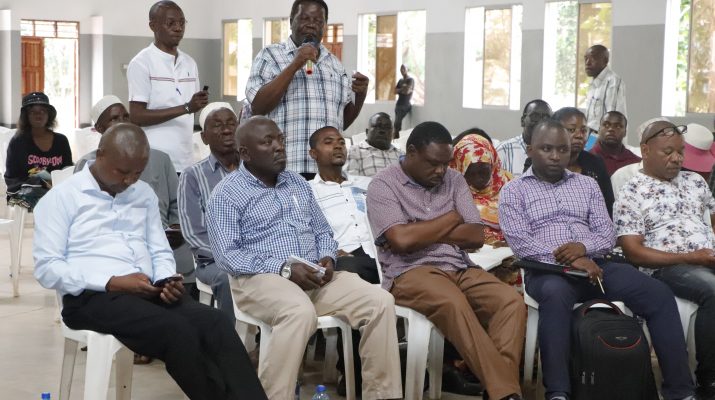A section of parents and education stakeholders in Kwale County contend that the new Competency Based Curriculum (CBC) was ‘expensive and cumbersome,’ hence its rollout should be suspended.
They said the new school curriculum was proving too expensive for parents/guardians at a time when majority of the Kenyans were facing economic hardships.
These sentiments emerged during a stakeholders’ engagement forum on education reforms organized by the presidential working task force on education reforms at Kwale High School.
The initial CBC cohort is now at Grade six and the Ministry of Education plans to roll out Grade Seven, the junior secondary class in January 2022.
The 42-member task force led by Prof. Raphael Munavu was formed last month by President Dr. William Ruto to review the entire CBC concept and has embarked on a tour of all the counties for engagement with members of the public on the way forward.
The teams visiting the counties will be receiving public views and written memorandum from stakeholders at county headquarters from 8 am to 4 pm in the next two weeks.
The reviews will touch on key areas including basic education, tertiary and university education as well as any other relevant issue touching on the entire education sector.
The Kwale team led by Prof. Leila Abubakar, Vice Chancellor Technical University of Mombasa (TUM) consisted of Prof. Hassan Mwakimako, Paul Lilan and Jane Kimiti.
Parents who appeared before the task force said they have to shoulder a huge part of the cost of the implementation of the new curriculum as the government phases out the 8-4-4 education system.
Ali Abdalla says the new CBC curriculum is already proving to be a costly affair that will only economically burden parents more.
He says there is nothing seriously wrong with the 8-4-4 system to warrant its complete overhaul.
Abdalla says the growing calls from parents across the country that the government abolishes the CBC and reverts to the 8-4-4 system, were a clear indication that the new system is unpopular with the majority of Kenyans.
“CBC seems to be shrouded in confusion from the word go and even those stakeholders charged with its implementation are groping in the dark,” he said.
A retired teacher, Ruth Mutisya says it seems many tutors still do not apprehend how the new syllabus works, adding to the confusion and anxiety surrounding the new education system.
She says the CBC has come with a lot of challenges including increased homework for the young learners that even involves parents.
Mutisya says the government should transform school infrastructure and enhance the capacity of teachers with the aim of raising the quality of education in the country.
On the other hand, a parent and a representative of a group of widows in Kwale, Meali Ali said while the rich can afford the CBC system, the poor would be left struggling and eventually left out.
She says the CBC system is very expensive and too demanding on parents and assumes that all children live with both their parents or with one parent, without contemplating that some could be complete orphans with no father or mother.
On his part, Mukasa Amboko who represents a teacher’s union said under-staffing, inadequate infrastructure and lack of adequate learning materials in most public schools hamper the effective implementation of the new education system.
“There is already congestion in most public schools due to lack of adequate infrastructure and the government’s 100 percent transition policy from primary to secondary level of education has made the situation worse,” he said.
He says local schools are already grappling with inadequate learning facilities and shortage of teachers, making the CBC roll-out in the region a toll order.
However, John Wainaina says CBC is not entirely a bad thing and should not be abolished as advocated by others, but its implementation should be improved.
He said the new education system is meant to mold the young learners into practical, all-round adults beyond the academic classwork, as opposed to rote learning, which was the legacy of the 8-4-4 system.
“Its high time that we embrace the new CBC system as it will go a long way in equipping learners with the right skills that will help industrialize Kenya as envisaged in vision 20230,” said Wainaina.
He said CBC is a pragmatic solution to unemployment as the learners are equipped with critical skills designed to make them innovative and job creators instead of job seekers.
A religious leader, Sheikh Abubakar Omar said CBC’s workload is overwhelming to the young learners to the extent that Muslim students do not have the time to attend Madrasa (Islamic schools).
The cleric said CBC is giving too much work to the pupils such that they come for the Madrassa classes when they are too tired to concentrate on the religious studies.
On her part, TUM VC Prof. Abubakar urged the public to feel free to air their views not only on the CBC curriculum, but on the entire education system from pre-primary to university level.
She said the conversation on how best to implement CBC should not only be limited to primary and secondary school levels, but also at Technical Vocational Education and Trainings (TVETs) and at the universities.
“I am heading the task force team that will be touring the coastal region and we are going to collect views on pre-primary, primary, secondary, tertiary and university level of education,” she said.
Meanwhile, the VC has urged members of the public to seize the opportunity and appear before the task force to give their views and recommendations on the new education system.
The public and the education stakeholders are also encouraged to send their views and recommendations to the taskforce via email to the secretariat@educationreforms.go.ke up to November 18th

